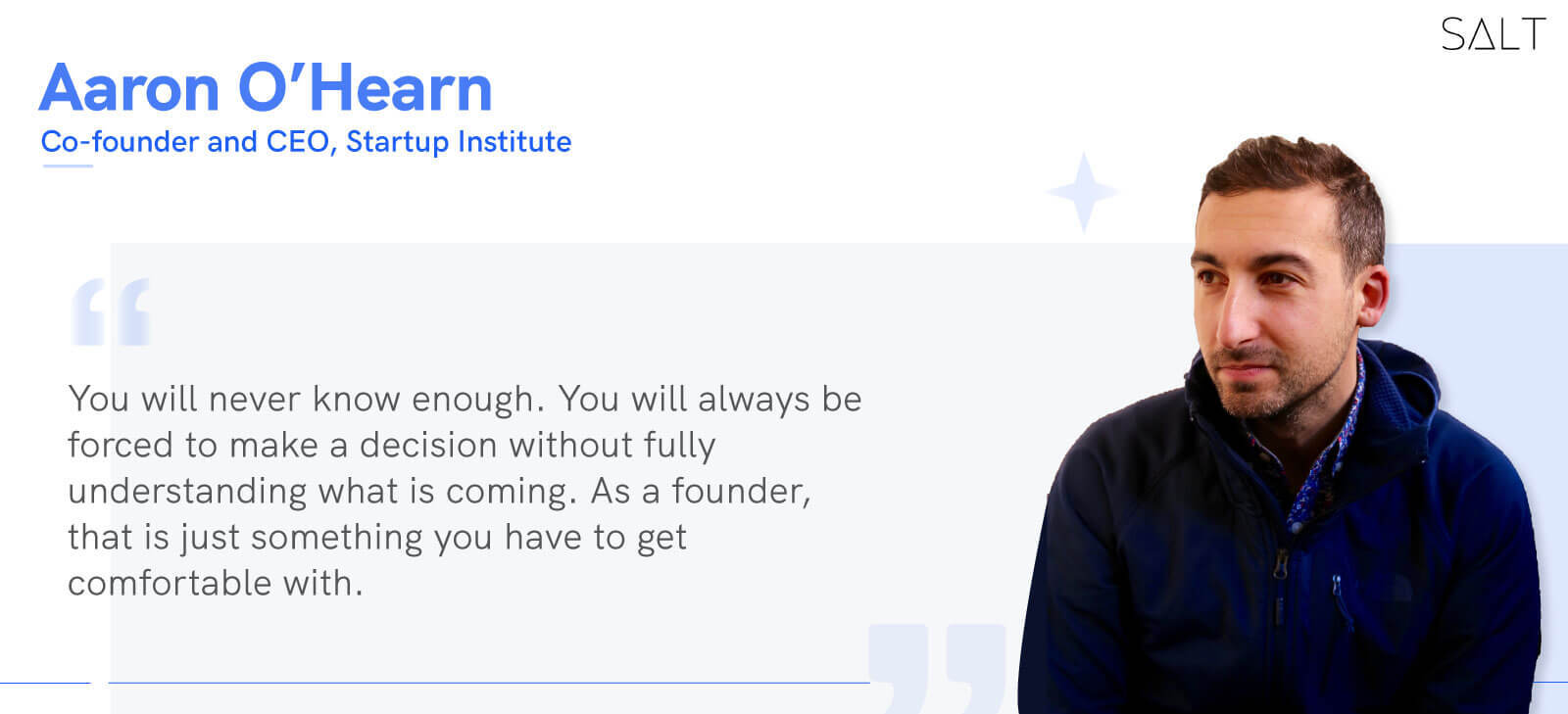If you are an early-stage founder intent on leading your startup to its zenith, it is always advisable to keep the investors’ expectations in mind. Without the VC money, early-stage startups risk running out of money and are left with fewer financing alternatives. Even if their suitcases are loaded, VCs investing in seed-stage startups are much more cautious about where to deploy their funds. In the current bear market, this trend is even more visible. For early-stage startups, this implies a slower pace of business and a greater struggle to close seed-stage rounds.

First-time founders need a lot of guidance on carrying forward their startup’s vision. These seed-stage VCs, besides bringing in capital, share some great pieces of advice, skills, and resources with their portfolio of early-stage startups. Read on to learn the five best candid pieces of advice from seed-stage VCs:
#1 It's not just about you
Focus on the startup goals and startup team
Ethan Austin, Co-founder and President of Give Forward, shares the best piece of advice he received from a VC as an early-stage founder, “The best advice is not to give yourself too much credit when times are good and too much blame when times are bad. Once you realize that luck plays a necessary role in success, it makes you both more humble and more self-confident at the same time.”
VCs advise early-stage startups to run their business ‘like it’s a business.’ Startup ecosystems are probably the best place for any business to thrive in. Make profitability a goal, manage expenses aggressively, and learn to keep your personal vision distinct from the company’s goals.
In this context, Jamyn Edis, Founder and CEO of Dash Lab, says, “Don't believe your own press, good or bad. Don't take yourself too seriously, even if you're trying to change the world. Never lose sight of the important stuff: love, friends, family.”
The founders should concentrate their efforts on developing relationships with mentors and senior experienced people. They should ask them questions, however silly or stupid they sound. These interactions will soon have the founders climbing up the ladder, taking others along.
#2 Show; Don't tell
Your actions should match your words
“For startups, being evidentiary about your value proposition is huge. So many upstarts talk about being the Facebook Killer or the X for Y, loftily and prematurely positioning them among mega successes. Talking instead about what your company does and has achieved sets the stage for your vision in a way that is authentic, believable, and much less highfalutin. Always be a producer of value, so you can highlight current and translatable proof of what you factually can do versus what you aspire to become,” says Shaun Johnson, Co-founder and CEO of Startup Institute.
Seed-stage VCs advise early-state founders to be as authentic as possible. Presenting lofty claims and unachievable goals only gives a hyperrealistic view of things but cannot entice the VC to invest in the early-stage startup if the early-stage startup lacks a roadmap or course of action. While every founder may want to be a Bill Gates, only rarely can someone match their calibre. Instead, it is feasible to work on one’s weaknesses and show rather than tell how to do business the right way.
#3 Get comfortable with the unknown
Know well your blindspots

While there is ample need to research your startup idea, seek guidance, and work in conjunction with a team to kickstart the operations, not everything turns out as planned. Businesses get affected by the social, political, cultural, and economic factors which are external to and not under the control of the startup. Prudence lies in preparing well in advance for unforeseen circumstances - counting the probable losses but ignoring the probable gains.
Also, first-time founders should realize their blind spots. They must act with conviction, believe in their intuition, and build relationships. But if they know themselves as not-so-good leaders, they should step down and allow the best person to take the responsibility.
#4 Find the balance
Never lose focus on what you are building
“Founders should proceed in a balanced fashion—aim for growth while keeping an eye on capital efficiency. You need to spend money on marketing and sales even during a down cycle. However, it must be done in a prudent way,” says Gale Wilkinson, Managing Partner at Vitalize Venture Capital.
While there is no dearth of talent, money, and ideas for the present startup ecosystem, these startups lack general management. The resources get eaten up, stuff takes longer to be completed than it usually does, and people struggle to coordinate and make a business work. If such a case scenario persists, it should be fixed before the startup crumbles due to inefficiency and poor management. There’s an even greater need to balance different functions within an early-stage startup that works on a strict budget, has limited team members, and has to perform within a set deadline.
-Chris Moore, partner at Redpoint Venture, reiterates, "Above all else, never lose focus on what you're building. The numbers don't lie. If your thing is working then VCs will always pay attention."
#5 Know when to let go
Not all Ideas are worthy of being adopted
“As a founder—or anyone who feels proud of and close to the product he or she creates—you struggle to have the right perspective about your business. It's easy to get too close, and that can be distracting. Here's the good and bad news: No one is looking at your work as closely as you are. So, remember that when you're on the hour four debating which shade of navy blue works best for your logo. Yes, details matter. But at a certain point, you have to let go and move on to the next thing,” says Pavia Rosati, Founder of Fathom
Though first-time founders must be proud of what they build and how they build it, it is also necessary that they realize that the product has no actual demand in the market or the idea won’t lead to a profitable business. Founders should also keep in mind what their competitors are doing but not stress themselves out worrying about it. Being direct and transparent with the team, even in worst-case scenarios, being kind and empathetic toward their needs, and encouraging them to take part in the decision making can also help first-time founders analyze whether an idea is worth taking the risk.
Parul Singh, principal of Founder Collective, says that early-stage founders should ask themselves, "Do you have the endurance for the marathon version of your company, or does this only work as a sprint? Can you survive if your product doesn't take off for 12-24 months? How about 36 months? The reality is that startups often struggle for a long time, and the beginning can be the slowest part."
Did you find the above gems of advice from early-stage VCs to first-time founders as effective? If you are a first-time founder of an early-stage startup looking to manage your international finances or seek FDI funds, Salt neo banking solutions and Table FDI solutions have got you sorted. Head over to Salt to claim your ticket to hassle-free finance and banking solutions!


